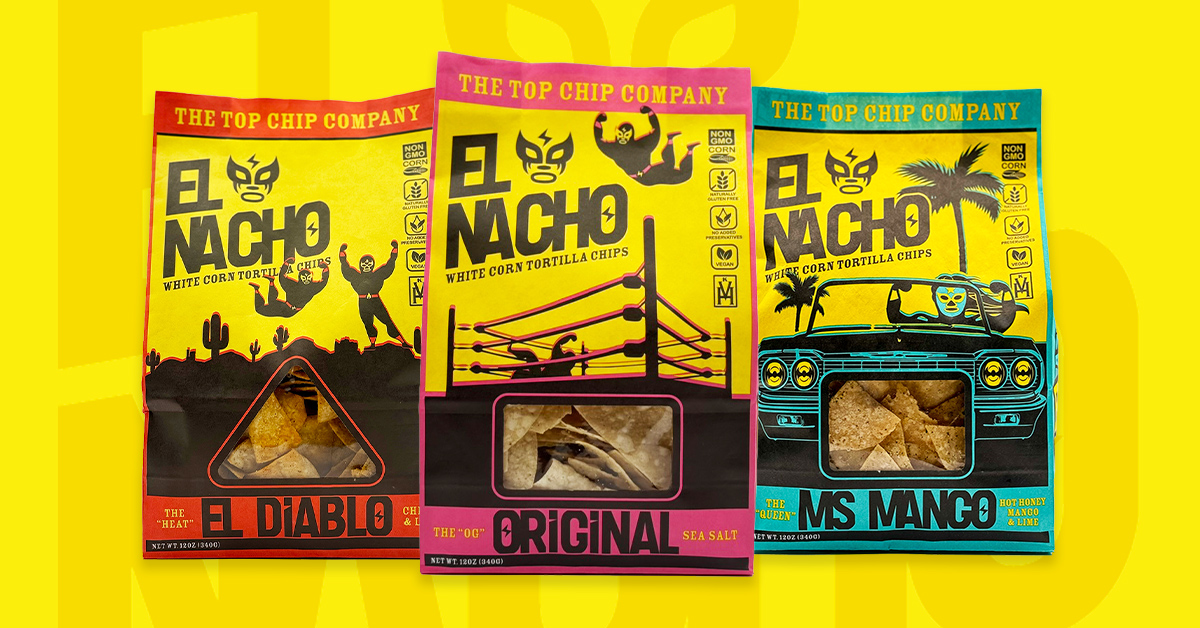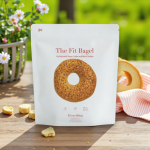El Nacho Enters the Ring As Boston Restaurateur Turns to CPG

The tortilla chip set is crowded, but with a total market share valued at $4 billion, one restaurant-backed, Boston-based brand believes there is plenty of room to build something “different.”
Enter El Nacho: the first CPG brand from The Alpine Restaurant Group, operator of popular Boston area spots such as The Painted Burro, Burro Bar and Posto. After constructing a production facility in Waltham, Mass., the team has been building the tortilla chip brand around a three-SKU line for the past nine months.
The business is housed under a new entity, Alpine Tortilla Company, and is growing fast, said president Joe Cassinelli. It has now reached over 2,500 regional and independent doors from coast to coast including Shaw’s, Big Y, Wakefern, Schnucks, and about 60 accounts in the San Francisco area. Cassinelli expects to be in another 1,000 doors by the end of the year
That growth has the brand already ahead of its five-year sales projections, spurring the search for a full time COO and plans for a second factory, likely in Texas. Cassinelli said he hopes to manage the brand building and business side and allow the COO to keep the factories running and product on shelves.
“It’s like a tsunami – all your cash just gets pulled out in the undertow, but then this giant wave is coming, [and] I feel like I’m just standing on the beach,” said Cassinelli. “We have orders coming at us for next year, which is great, but we need to build another factory [and] we’re still self-financed.”
Chip Creating Credentials
Though the brand is still in its early stages, El Nacho carries serious credentials within the category, starting with co-founder Tobe Armendariz. Over the course of a decade with the brand, Armendariz was a central figure in growing Massachusetts-based tortilla chip brand Mi Nina, including creating the original chip recipe, helping scale up operations and build the brand.
After a conflict with ownership forced him out of the business, Armendariz came to Cassinelli during the pandemic – whom he had met while working for Jamie Mammano, a local restaurateur and owner of Mi Niña and the Columbus Hospitality Group – with the idea to open a new, artisan-focused tortilleria. The new business is a 50/50 split between Casinelli and the Armendiaz brothers Tobe and Hugo, the latter of whom was the former head of DSD sales at Mi Nina and now serving in the same role at El Nacho.
Cassinelli said he saw multiple opportunities within the tortillaria idea. First, launching a company allowed him to upgrade the chips and tortillas used at his Mexican restaurants beyond standard commodity products while keeping everything in-house. Additionally, after working in the restaurant world for nearly 35 years, Cassinelli is itching for a new adventure in learning how to build a chef-backed brand in the CPG space.
Under El Nacho, Tobe Armendariz has now produced a “more artisan” chip that highlights flavor and texture. The brand’s three SKUs – Original (Sea Salt), Ms Mango (Hot Honey Mango and Lime) and El Diablo (Chiles and Lime) – are seasoned with real fruit and vegetable powders rather than flavor extracts.
“It is really an art form,” said Cassinelli. “It really comes down to the cooking of the corn, the grinding of the corn, and then making a tortilla. The way everything happens up through the baking part of the tortillas is all the magic that differentiates these chips from [other] chips. We want to set that standard. Our chip is super flaky. It’s strong, it holds up to dip, but it doesn’t dry your palate out… I think that’s where we really excel.”
Scooping Out Shelf Space
According to Cassinelli, the team originally believed they would be competing directly with other tortilla chip brands, such as Mission and Xochital, but their focus on flavor has actually put them on a playing field with Doritos, Siete, Late July and other gourmet chip brands with interesting flavor varieties. El Nacho also already has plans for a fourth SKU, Pineapple BBQ, coming soon.
But as they’ve worked to build the business, a regional tortilla chip turf war has often reared its head; according to Cassinelli the brand has faced hesitance from a few New England-area buyers with loyalties to Mi Niña. That has led El Nacho to “leapfrog” the Northeast in search of retail partnerships on the West Coast and in the Midwest where Cassinelli sees more whitespace to grow the premium tortilla chip category.
“In [some buyers] head, the category is defined,” said Cassinelli. “It was Mission, it was Xochitl, it’s Tostitos. They have Doritos. And [ask] why do I need another chip?” he recounted. “The other part is… a lot of buyers are so price conscious. They’re pigeonholing a lot of their customers into how much they’re willing to pay for a product. We are trying to break that expectation saying ‘you need to give your customers a chance to spend more.”
A bag of El Nacho chips retail for only about 75 cents more than its closest competitors, or about $4.99 to $5.99 per 12 oz. bag, Cassinelli said. He is following a position he’s honed in the restaurant industry, particularly at his Neapolitan pizza shop Posto, as a way to appeal to consumers who may be on the fence.
“I’m not telling you my pizza is better – we’re different,” he stated. “This is how we’re pitching it: If you care about quality, if you care about really unique, interesting flavors, if you care about foods [that are] non-GMO, all natural, [made with] good ingredients for you and you’re not going to feel guilty, then you should check us out. It’s just an educated choice.”
That principle will also guide El Nacho into the future where Cassinelli envisions a portfolio spanning well beyond tortilla chips including salsa, spice rubs, dips and more. Although he has nearly 35 years in the restaurant world he said he’s extremely excited about diving into CPG, noting that running restaurants during the pandemic took some of the fun out of the business
Cassinelli and his team are also working to ensure a sense of fun remains with the company as it grows up. Its suite of flavor-based, Luchador-themed characters have been woven into the brand identity and will guide all future innovation and storytelling moving forward, he explained. Those characters give El Nacho both a built-in marketing engine, but also helps broaden the brand’s appeal to consumers of all ages.
“We wanted to come up with a brand that was exciting and appealing to the entire family and across markets,” said Cassinelli. “There’s tons of innovation in the potato chip segment, [but] everybody in that tortilla segment is going for social mission things [with] your standard table chip, if you will. We wanted to be different.”

















